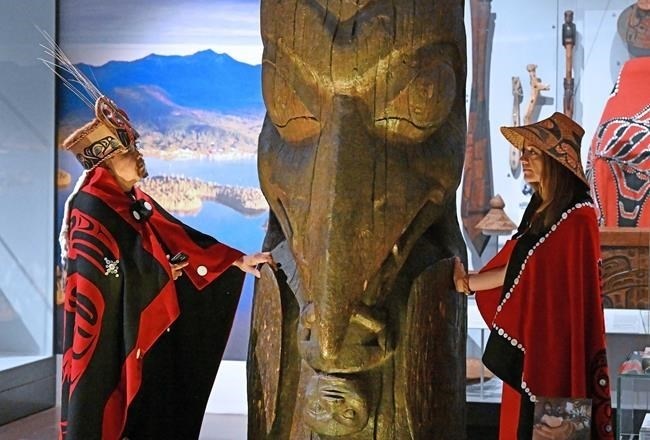
Amy Parent, right, is shown with the Ni'isjoohl memorial pole alongside Nisga'a Chief Earl Stephens during a visit to the National Museum of Scotland in this handout image provided by National Museums Scotland. Parent says the pole is set to begin its month-long journey home to the Nisga'a Nation in northwestern British Columbia.
Image Credit: THE CANADIAN PRESS/HO-National Museums Scotland-Neil Hanna
August 27, 2023 - 9:00 PM
A memorial totem pole belonging to members of the Nisga'a Nation in northwestern British Columbia is about to begin its journey home from the National Museum of Scotland in Edinburgh, where it has been on display for nearly a century.
Amy Parent, a member of the nation and Canada Research Chair in Indigenous education and governance, said she expects to feel a deep sense of peace when the pole that's alive with the spirit of a relative returns to the Nass Valley.
The pole is set to make its journey in the belly of a Canadian military aircraft as a result of what Parent described as an unexpected moment of reconciliation.
While the Scottish museum initially planned to transport the 11-metre pole by ship, Parent said she felt moving it by plane would reduce the risk of damage.
"I'm so grateful that we have some strong negotiators who happened to be in Ottawa," she told The Canadian Press on Thursday as she prepared to leave for Scotland the next day as part of a delegation of Nisga'a community members.
"I jokingly texted them and said, if you're talking to some senior Canadian officials, tell them ... I want our totem pole to be sent home on a plane."
Parent said her message "led to a conversation with the right person," and a brigadier general came forward to support the pole's return.
A representative from the Department of National Defence was not immediately available to comment on the military's role in returning the artifact.
The hand-carved pole was commissioned in 1960 to honour a member of the House of Ni’isjoohl, who was next in line to be chief but died protecting his family and nation, the Nisga'a Lisims government said in a statement earlier this month.
The pole was taken without the nation's consent in 1929 by an ethnographer researching Nisga'a village life, who then sold it to the Scottish museum.
The negotiations over what Parent calls the "rematriation" of the pole have taken a year. A Nisga'a delegation travelled to Scotland to ask for its return in August 2022, and the museum's board of trustees approved the plan later last year.
A previous Nisga'a delegation made the trip to Scotland to request the pole's return two decades ago but an official at the time indicated it was too old to be moved, said Parent, who is a professor in the Faculty of Education at Simon Fraser University.
This time, Canadian experts assessed the pole's condition and expressed confidence that it could safely be transported home, she said.
"That also galvanized us to go there and start our discussions with the museum around repatriation last summer," Parent said.
A statement from Chris Breward, director of National Museums Scotland, said museum staff have been planning for the "complex task" of carefully lowering the pole in what is the first return of its type by an institution in the United Kingdom.
Parent is among those who have returned to Scotland, where a ceremony is to be held Monday to ask the spirit within the pole to rest while it's transported, she said.
The process to remove the pole from the museum could take nearly two weeks, she said. Canadian Forces will then pick it up from a Scottish military base.
Nisga'a community members are "ecstatic" at the pole's return, Parent said.
A ceremony and a feast for as many as 1,000 people is being planned to mark its expected arrival on Nisga'a lands on Sept. 29, she said.
Parent said they've achieved something she felt would be "impossible" in orchestrating a successful repatriation at the international level.
The basic first steps any institution can take is finding the rightful owners of artworks and other cultural treasures held in its collections and sharing the items' history in a way that accurately and respectfully reflects their origins, she added.
This report by The Canadian Press was first published Aug. 27, 2023.
News from © The Canadian Press, 2023